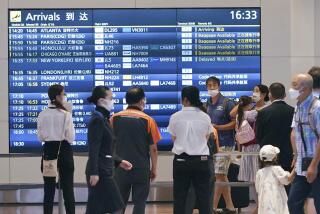Japan Vows Market-Opening Plan by End of March : Trade: Strategy could include deregulation, along with promotion of imports and investment.
- Share via
TOKYO — Japan, hoping to avert a trade war with the United States, said Friday that it will draft a package of market-opening measures by the end of March. Convincing Washington, however, looks to be a tough job.
“We are waiting to hear from your government what steps they propose to do,” U.S. Ambassador Walter Mondale said in a speech hours after Cabinet ministers met to discuss the package.
“I stand ready, our government stands ready, to work with Japan if proposals are made that will make a difference,” Mondale said.
Prime Minister Morihiro Hosokawa and nine of his ministers in charge of economic, trade and foreign policies agreed at the special Cabinet meeting to work out a plan.
They said they hope to present it by the end of March to the United States, which is poised to back up its trade demands with possible economic sanctions unless the two countries reach agreements in their so-called economic framework talks.
Japanese officials say the market-opening strategy is likely to include deregulation, import and investment promotion and improvement of government procurement procedures.
Washington is waiting to see whether Tokyo follows through with actions that produce results. “I’m more concerned about whether they come up with things that will really make a difference,” Mondale said. “I’m a little skeptical.”
Mondale also said he was unimpressed by suggestions that Japan might set a non-binding goal to cut its current-account surplus to 2.8% of its gross domestic product.
He noted that such a voluntary target would be nothing more than a restatement of Japan’s existing official forecast for the fiscal year beginning April 1.
He also echoed recent U.S. dissatisfaction with Japan’s latest $143-billion stimulus package, which he said would do little to boost its economy or cut its surplus.
Japan’s global current-account surplus rose to a record $131.35 billion in calendar 1993.
As part of the Japanese government’s effort to appease Washington, the Japan External Trade Organization, or Jetro, once the key body behind the country’s export drive, said it has turned its campaign focus to promoting imports.
About 70% of Jetro’s efforts now focus on import promotion over exports, Chairman Toru Toyoshima said in an interview.
Jetro said its “big push” to encourage imports has included holding foreign product fairs focusing on leisure and recreation or health care and featuring goods from foreign makers. California rice, only recently allowed to be imported in restricted quantities, has been displayed in department store basements.
More to Read
Sign up for Essential California
The most important California stories and recommendations in your inbox every morning.
You may occasionally receive promotional content from the Los Angeles Times.













